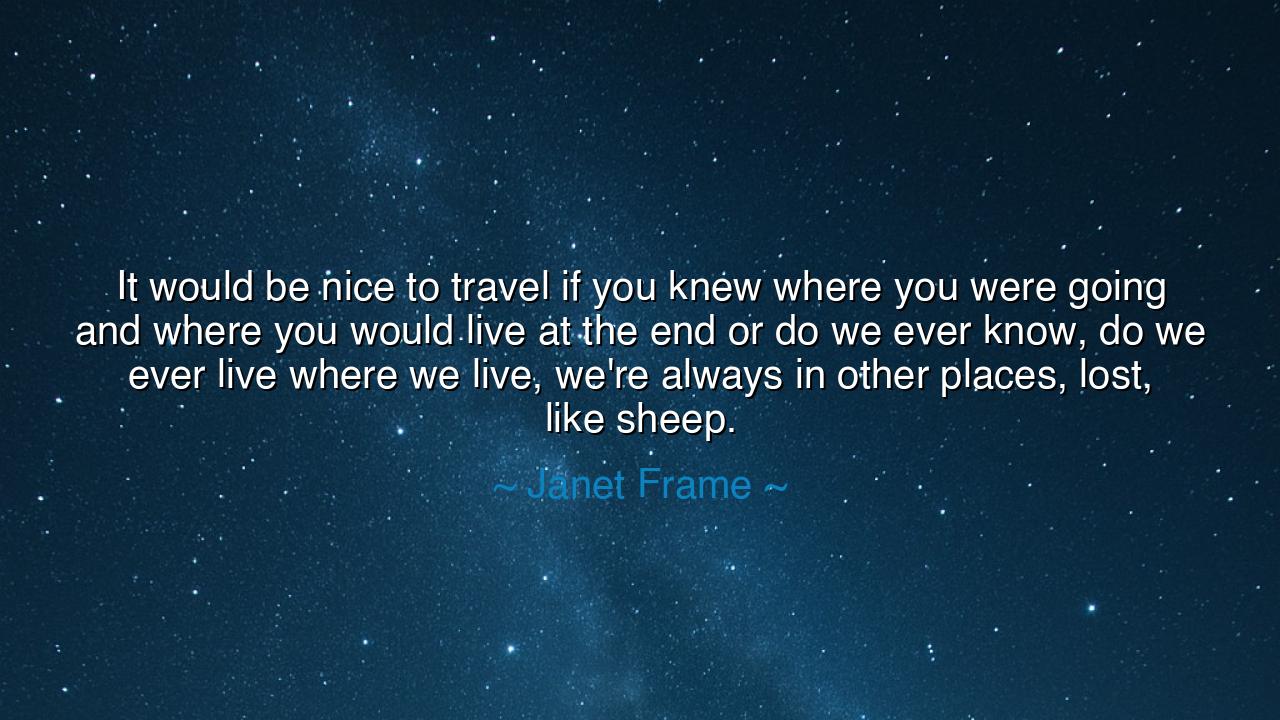
It would be nice to travel if you knew where you were going and
It would be nice to travel if you knew where you were going and where you would live at the end or do we ever know, do we ever live where we live, we're always in other places, lost, like sheep.






Janet Frame, whose life was marked by exile, fragility, and luminous insight, once spoke with haunting honesty: “It would be nice to travel if you knew where you were going and where you would live at the end—or do we ever know, do we ever live where we live, we’re always in other places, lost, like sheep.” In this single sentence, she unveils the paradox of human existence: that though we wander seeking certainty, our dwelling is always uncertain, our roots often fragile, and our souls restless, as if our true home forever eludes us.
The first wisdom lies in the longing “to know where you were going.” This is the dream of every traveler—not only of roads, but of life itself. Men and women alike yearn for maps, for certainty, for the knowledge of their destination before they set forth. Yet Frame reminds us that this is an illusion. We do not know where the road ends; the future is hidden. To live is to journey without final directions, to walk with faith amid uncertainty.
The second truth rests in the mystery of where we will live. She asks if we “ever live where we live.” This is the paradox of presence: the body dwells in one place, yet the mind drifts elsewhere. We dream of other lands, regret the past, or anticipate the future. Rarely do we inhabit fully the soil beneath our feet. Thus, Frame suggests that homelessness is not only geographical but spiritual—we are always in other places, never fully at home even when the walls around us are familiar.
History bears witness to this eternal exile. The Israelites, wandering in the desert, longed for a promised land they had not yet seen. Augustine confessed in his Confessions that his heart was restless until it rested in God. Even great conquerors such as Alexander, though surrounded by kingdoms, never felt at rest, always seeking another horizon. All testify to Frame’s vision: the human condition is one of seeking, of yearning, of being somehow lost even while dwelling.
Her imagery of sheep deepens the teaching. Sheep are creatures that follow paths not always their own, easily scattered, often dependent upon a shepherd. By likening humanity to sheep, Frame calls forth humility: we are not as self-sufficient as we imagine. We wander, we stray, we lose our way, both outwardly and inwardly. Without guidance, we are prone to being scattered across the hills of longing and distraction. The image is ancient, echoing Scripture, where prophets and poets alike called lost souls sheep in need of gathering.
And yet, her words are not despair alone—they also reveal possibility. For if we are lost, then we may also be found. If we are sheep, there must be shepherds, whether faith, love, art, or purpose, who can call us back to a sense of belonging. Frame herself, who endured near-tragedies of misdiagnosis and exile, found in writing her shepherd—through words, she gathered her scattered self, and through stories, she carved a place to “live” even amid uncertainty.
The lesson, then, is profound: do not expect certainty, and do not despair at wandering. To travel without knowing the end is the very nature of life. But strive, amid the restlessness, to learn presence—to live where you live, to be awake to the soil under your feet, to the breath in your lungs, to the people beside you. You may always be a traveler, but you need not always be absent. To be present is to transform wandering into pilgrimage.
Practical counsel follows: when you feel lost, do not curse it. Instead, seek a center—a shepherd for your soul. This may be faith, friendship, art, or simple stillness. Cultivate presence each day, anchoring yourself in the here and now even while the future remains uncertain. For as Janet Frame shows us, though we are sheep scattered across the hills of existence, the path of awareness can still gather us home, even if that home is not a fixed land, but a state of being.






AAdministratorAdministrator
Welcome, honored guests. Please leave a comment, we will respond soon